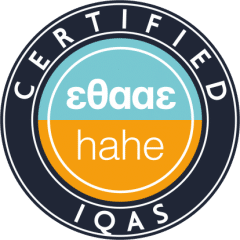Learning Outcomes
The course focuses on the production and editing of digital photographic content for different uses and applications. Upon completion of the course students will have advanced knowledge, skills and competencies related to:
- The structure and information levels of the digital image
- Processing techniques and methodologies
- The requirements and objectives of optimum image editing
- The ability to evaluate tonal and color corrections
- Optimal configuration of an editing system
- The ability to make decisions that determine the aesthetics of the photographic image
- Communicating the requirements of optimal editing to other professionals
- The ability to design effective work flows.
General Competences
- Applying knowledge to practice
- Search, analyze and synthesize data and information, using the necessary technologies
- Adaptation to new situations
- Decision making
- Independent work / Teamwork
- Working in an international / interdisciplinary environment
- Project planning and management
- Exercising criticism and self-criticism
- Promoting free, creative and inductive thinking
Course Outline
The working environment, digital image processing methodologies and techniques. Digital tools – commercial software, good practices, pixel editing, parametric editing, non-destructive editing methods, color management, tone and color corrections, color grading.
BIBLIOGRAPHY
- Kolokythas, K., 2015. Digital media in the audiovisual arts. Athens: Association of Greek Academic Libraries.
- Kolokythas, K., 2016. Color Management-A Brief Overview. Athens: Self-published.
- Nigel Chapman, Jenny Chapman. Digital Multimedia. West Sussex: John Wiley & Sons, Ltd, 2009.
- Katrin Eismann, Sean Duggan, Tim Gray, 2010. Real World digital photography, Peachpit Press
- Course notes
- Online resources
Course bibliography is dynamically formulated and is always available at the beginning of the semester through the Foundation’s asynchronous education platform.


